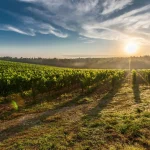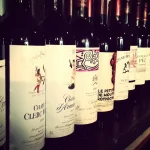Setting ourselves up for autumn reds, today’s peek “under the radar” looks at a variety that manifests itself in dozens of blends but is seldom allowed out on its own as a varietal.
Nevertheless, it was a surprise to discover that no mourvedre is currently listed in unblended format in any of the “big four” supermarkets.
Even the terrific Les Jamelles Mourvedre seems to have disappeared from the High Street.
Admittedly the grape’s demands as a sun worshipper (it seldom ripens fully even in some parts of the Southern Rhone) make difficulties – as do its fussiness about soils and the challenges it poses within the winery once harvested.
Nevertheless, get it right and its herbal, bramble influenced richness can provide lovely wine – often for relatively little money.
Thought to be an early favourite with monks around Valencia (hence its Spanish name – monastrell), it was best known for the power and slight rusticity it adds to GSM Rhone blends – until recently that is!.
Nowadays, a group of little known appellations around Murcia (just south of Valencia) have dedicated themselves to creating quality monastrell – and very successful they are at it.
Indeed, I commended several good options involving the variety in my post about Spain a few weeks ago.
Here, though, is a more detailed look at the variety.
As normal, this site uses images and hyperlinks are used where possible to make the wine easier to recognise and, potentially, to buy.
Starting near monastrell’s original hometown
Although winemakers in Alicante (two hour’s drive from Valencia) also use monastrell to produce a local rival to oloroso sherry, it was there that the “let’s make brilliant monastrell table wine” thinking seems to have begun.
So, here is a very successful but inexpensive example of what they set out to achieve.
Dark in colour yet attractively floral, 2019 Tarima Monastrell Alicante (from £7.99 at Majestic and 14%) exhibits bright bramble, damson and elderberry flavours accompanied by firm tannin (but lively acidity) with black pepper, eucalyptus and vanilla components and a hint of sweetness.
Three from a nearby area
The tight knot of relatively small wine regions just inland from Alicante is as much a magnet for visitors as the Mediterranean beaches themselves, hence the development of Murcia Wine Tours like this one – featured in the 3 minute video embedded in a blog post.
A frequently encountered place in any such tour is Yecla – a tiny area some 50 kms away from the coast where monastrell really prospers and which is home to the next three wines.
Concentrated and with appealing coffee aromas, 2019 Tapa Roja Old Vines Monastrell (£7 at M&S and 13.5%) brings us soft red plum and blackcurrant flavours supported by good acidity and judiciously balanced tannin but with hints of mint, clove, liquorice and oregano too.
Increasing the altitude
For the next example, we consider wine from some of Yecla’s higher vineyards and one that gives us fuller, earthier flavours from older vines and for which you will need to visit (possibly online) one of the UK’s band of excellent independents.
2019 Familla Castano Hecula Monastrell (£10.99 at Noble Grape and 14%) contains elderberry and prune flavours partnered by herbal based savouriness, good acidity (but limited tannin) and touches of olives, black pepper and liquorice.
And going organic
The final Yecla option is also made by the acclaimed Castano operation but is organic (an approach that seems to work well in hotter, drier conditions like those in Yecla) and represents the style at its best – and was my favourite among the inexpensive monastrells I tried.
Smooth with attractive traces of sweetness, 2019 Parcelas Ecologico Barrica Monastrell (£7.95 at The Wine Society and 14%) provides minty mulberry and blackberry flavours embellished with sage, nutmeg and aniseed elements, good acidity but limited tannin.
Across the Pyrenees
True to their Burgundian homelands, Catherine and Laurent Delaunay produce excellent chardonnay and pinot noir, having worked hard to find suitable sites for these varieties in Languedoc.
They also make wine from other varieties (many under the Les Jamelles name I mentioned earlier) and this is one they produce from mourvedre grapes – rather than seeing them used as blending partners.
Intense and rich, 2018 Abbotts & Delaunay Mourvedre Les Fleurs Sauvages (£10.75 at The Real Wine Company and 13% abv) has raspberry and damson flavours that combine nicely with its firm acidity (but gentle tannin) and with the wine’s suspicions of mocha, lavender and savoury herbs.
Next, a Quiz Question
Are the world’s oldest surviving mourvedre vines in Spain or France?
Answer: Neither – Australia’s Barossa Valley has a block of those vines (called mataro in the new world) that dates from 1853.
As elsewhere, the variety demands a hot, dry climate and (also as elsewhere) much of it finishes up in blends but …
Several Australian and Californian producers do make excellent varietal mataro which tends to be richer and more complex than European versions.
Although it is encouraging that the variety now seems to have caught the imagination of younger winemakers, the downside of these more concentrated wines is that they are usually more specialist offerings and can be dearer.
Let’s look at two of them
The Turkey Flat operation has been tending vines for around 175 years and for most of that time (as now) has been in the hands of the Schulz family producing largely “Rhone variety” red wines and with a great record of experimentation.
Perfumed and sophisticatedly rounded, 2018 Turkey Flat Mataro (£22 at Wine Direct and 14.3%) is one example of that readiness to be unorthodox, delivering smoky mulberry and bramble flavours with good acidity but balanced tannin and traces of cocoa, clove and sage.
And another example
Although the Duval family has a similarly long farming history, John Duval was the first family member to transition into winemaking.
After over 15 years as Chief Winemaker at Penfolds, he started John Duval Wines producing high quality shiraz and GSM blends, for instance, and adding mataro to his wine list in 2016.
Lighter and slightly smoother than the Turkey Flat, 2017 John Duval Wines Annexus (£36.99 at Simply Wines and 13.5%) offers us intense plum and blackcurrant flavours complemented by orange zest acidity and gentle tannin together with suggestions of oregano, mint, nutmeg and delicate hints of sweetness.
In summary
So, whatever name it bears, here is a versatile grape offering great value (but underappreciated) everyday wine that can also step up to the plate with brilliant “special occasion” wine to grace any event.
Join me again on Monday for my recommended Top Tips and for a whistle stop tour of supermarket promotions.















